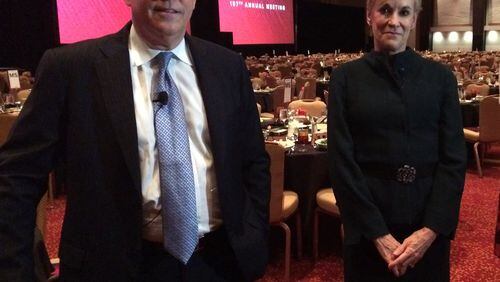Top brass at the Metro Atlanta Chamber said Wednesday they will make avoiding another firestorm of controversy over “religious liberty” legislation a top priority when the state Legislature reconvenes in January.
SunTrust Banks Executive Vice President Jenner Wood, the outgoing chairman of the chamber’s board, said the conversation alone over the legislation, which critics deride as discriminatory toward lesbian, gay, bisexual and transgender people, is damaging to the state’s reputation of tolerance and inclusion. It also can dent Georgia’s economic progress since the recession.
Earlier this year, the state House and Senate passed HB 757, igniting days of unblinking media coverage and calls by business leaders and civil rights groups for Gov. Nathan Deal to veto the measure. He did a few days after the session ended.
Deal’s veto angered many in the Republican base, and supporters of the legislation have vowed a new battle in 2017.
“We are not supportive of any bill that in any way would discriminate against any person,” Wood said in a media briefing ahead of the chamber’s annual meeting.
The powerful business coalition has been one of the more forceful voices for the past three years against various bills that supporters say better protects the faithful from government intrusion into their sacred rights, but which critics deride as a thinly-veiled attempt to discriminate against the LGBT community.
Wood pointed to the controversy that swirled around North Carolina after that state passed a law barring transgender people from using public bathrooms for the sex they identify as.
The NBA and NCAA moved marquee events from the state. Georgia beat out the Tar Heel state for megawatt jobs deals, including a software hub for GE Digital and a division headquarters and software center by Honeywell. Georgia’s rejection of HB 757, and North Carolina’s bathroom bill, played a role in both recruitments, company officials and recruiters have said.
The headlining corporate recruitments give the Deal administration and its allies new ammunition in what's expected to be a bitter rematch in the months ahead.
Jeff Sprecher, the chairman and CEO of Intercontinental Exchange and the incoming chamber board chairman for 2017, said the potential damage to the state’s reputation is real. Global companies want to be able to recruit top talent worldwide and want prospects to feel welcome.
Also Wednesday, chamber officials said continued advocacy for transit expansion and improvement will be another priority. That could include rail in North Fulton County, DeKalb and more seamless integration of the region’s local transit providers.
The chamber hailed the city of Atlanta’s passage in November of a half-penny sales tax to expand MARTA.
Fulton County Chairman John Eaves has said MARTA expansion in the county, particularly a line up Ga. 400 to Alpharetta, is crucial and that the county would work towards legislation allowing for voters to consider a quarter-penny sales tax for transit in areas of Fulton outside of the city of Atlanta.
“The next steps would be to look to North Fulton and see if expansion could happen there,” said Katie Kirkpatrick, chamber chief policy officer. “The second piece is how can we expand transit east into DeKalb County, and perhaps connect the area around the CDC and Emory [University] into the downtown area of Atlanta.”







